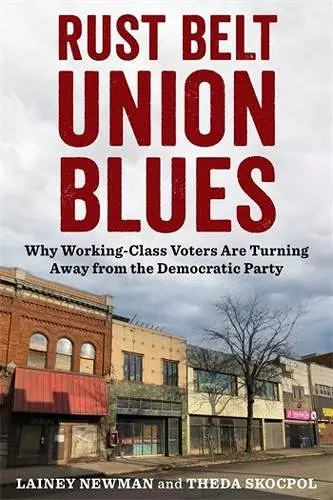Rust Belt Union Blues
Why Working-Class Voters Are Turning Away from the Democratic Party
Theda Skocpol author Lainey Newman author
Format:Paperback
Publisher:Columbia University Press
Published:12th Nov '24
Should be back in stock very soon

In the heyday of American labor, the influence of local unions extended far beyond the workplace. Unions were embedded in tight-knit communities, touching nearly every aspect of the lives of members—mostly men—and their families and neighbors. They conveyed fundamental worldviews, making blue-collar unionists into loyal Democrats who saw the party as on the side of the working man. Today, unions play a much less significant role in American life. In industrial and formerly industrial Rust Belt towns, Republican-leaning groups and outlooks have burgeoned among the kinds of voters who once would have been part of union communities.
Lainey Newman and Theda Skocpol provide timely insight into the relationship between the decline of unions and the shift of working-class voters away from Democrats. Drawing on interviews, union newsletters, and ethnographic analysis, they pinpoint the significance of eroding local community ties and identities. Using western Pennsylvania as a case study, Newman and Skocpol argue that union members’ loyalty to Democratic candidates was as much a product of the group identity that unions fostered as it was a response to the Democratic Party’s economic policies. As the social world around organized labor dissipated, conservative institutions like gun clubs, megachurches, and other Republican-leaning groups took its place.
Rust Belt Union Blues sheds new light on why so many union members have dramatically changed their party politics. It makes a compelling case that Democrats are unlikely to rebuild credibility in places like western Pennsylvania unless they find new ways to weave themselves into the daily lives of workers and their families.
When workers decades ago spoke the words, 'This is a union town!' they were describing not just a statistical fact but, more importantly, a lived and embedded reality. Unions, as Lainey Newman and Theda Skocpol write, represented 'a dense social web of interconnected workers, family members and neighbors.' Rust Belt Union Blues is an immensely important book, both for politics and for the social sciences. Politically, it explains why many white workers strayed from their old Democratic loyalties not because their views changed radically but because of transformations in their reference points and the ways they answered the need for community. Rust Belt Union Blues also calls on social scientists to enrich and go beyond survey research by paying far more attention to the networks people build and the lives they live. This book deserves wide readership—and may it encourage more volumes like it. -- E.J. Dionne Jr., author of Why the Right Went Wrong, coauthor of 100% Democracy
In recent decades many working-class voters have turned away from the Democratic Party, especially in the country's former industrial regions. Rust Belt Union Blues shows how the decline of labor unions contributed to this trend. Unions historically built solidarity around shared values in working-class communities; the erosion of union strength has weakened these communities and this solidarity, profoundly changing working-class life. Rust Belt Union Blues is fascinating and important reading for anyone interested in the past, present, and future of working-class politics in America. -- Jeffry Frieden, author of Global Capitalism: Its Fall and Rise in the Twentieth Century and Its Stumbles in the Twenty-First
How refreshing to read a challenging account of how and why the Democratic Party lost a major constituency that attends to the people themselves, their communities, their organizations, and their struggles to make meaning of a politics that ceased to see them, hear them, or value them—to even respect them. For once, the authors enable us to hear the voices of human beings—not data points, utility functions, ideological categories, or labels. This work challenges us to focus on what a real constituency is—not a 'base' to be managed, but people who learn to stand together, work together, decide together, and act together. -- Marshall Ganz, Harvard Kennedy School
Read this book to better understand the roots of today’s political polarization. Newman and Skocpol document local unions’ historical role in the social life of manufacturing communities and show how deindustrialization and the disappearance of local unions helped turn these communities from blue to red. -- Frank Levy, MIT
A more granular look at the pre-Biden Democrats’ abandonment of working-class America...that illuminates the decline of an economic, social, and political world that once bolstered progressive and Democratic prospects. * American Prospect *
Newman and Skocpol’s diagnosis of the causes and basic solution to the problem of working-class dealignment in the rust belt is right on the mark. * Jacobin *
Recommended. * Choice *
[An] excellent book. * New York Labor History *
An original and very persuasive case. * New Republic *
The book’s engaging narrative, enriched with unique archival and ethnographic data alongside vivid personal narratives, makes it an essential read for anyone seeking to comprehend the latest shifts in American politics and the impact of labor unions. * Contemporary Sociology *
ISBN: 9780231218795
Dimensions: unknown
Weight: unknown
328 pages